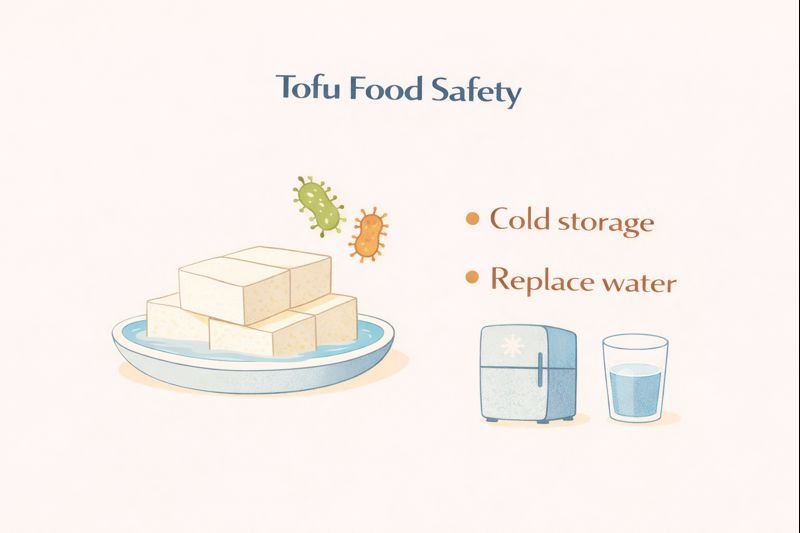Tofu Food Safety: Storage, Risks, and First Aid Awareness
Tofu is widely regarded as a nutritious, lean source of plant-based protein. While it offers many health benefits, tofu is also considered a potentially hazardous food because it contains moisture and nutrients that allow harmful microorganisms to grow if it is not handled or stored properly.
With appropriate storage, refrigeration, and preparation practices, tofu can be safely enjoyed at home and in food service settings.
First Aid & Workplace Relevance (Canada)
Tofu food safety is relevant in Canadian households, restaurants, cafeterias, healthcare facilities, schools, and workplaces where food is prepared or served. Improper storage or handling can increase the risk of foodborne illness, particularly when tofu is sold or stored in water.
First aid and food safety awareness emphasize prevention, safe storage practices, and recognizing symptoms of foodborne illness early.
Scenario: Food Handling Awareness Prevents Illness
A food handler noticed an open container of tofu stored in standing water for several days. Recalling food safety training, they replaced the water, checked storage temperatures, and discarded tofu past its safe use window. This simple step helped reduce the risk of foodborne illness for others.
What Is Tofu?

Nutritionally, tofu:
-
Is a good source of lean protein
-
Is low in sodium
-
Is low in saturated fat
-
Contains no cholesterol
Because tofu has a mild flavour, it readily absorbs the taste of other ingredients, making it a versatile food in many cuisines.
Why Tofu Requires Food Safety Awareness
Tofu contains high moisture and protein, which create an ideal environment for bacteria to grow if temperature control is poor. Harmful microorganisms may grow:
-
On the tofu itself
-
In the water used to store or package tofu
Foodborne illness linked to tofu is uncommon but has occurred, often due to contaminated storage water or improper handling.
Signs and Symptoms of Foodborne Illness
Symptoms of food poisoning related to contaminated tofu are similar to other foodborne illnesses and may include:
-
Nausea
-
Abdominal cramps
-
Gas or bloating
-
Vomiting
-
Diarrhea
-
Fever
-
Headache
Symptoms typically begin hours to days after consuming contaminated food.
Buying Tofu Safely
Tofu is available in several packaging formats:
Refrigerated Tofu in Water
-
Sold in sealed packages with water
-
Requires continuous refrigeration
Bulk Tofu in Water Bins
-
Often sold floating in open containers of water
-
May pose a higher food safety risk
-
It is reasonable to ask how often the tofu and water are replaced
Aseptically Packaged Tofu
-
Shelf-stable until opened
-
Does not require refrigeration before opening
-
Has a long shelf life when unopened
Proper Storage of Tofu
Food safety awareness includes proper refrigeration and storage:
-
Store tofu in the refrigerator at cold temperatures
-
Once opened, aseptically packaged tofu should be refrigerated and used within a short timeframe
-
Tofu stored in water should have the water replaced daily and be used promptly
-
Tofu can be frozen, but should be thawed safely in the refrigerator
-
Cooked tofu leftovers should be refrigerated promptly
Improper storage increases the risk of bacterial growth.
Cooking and Serving Awareness
Most commercially packaged tofu is pasteurized and safe to eat without further cooking if food safety practices have been followed.
However:
-
Tofu sold in bulk water bins poses a higher risk
-
Unpasteurized tofu should be thoroughly cooked before consumption
-
Heating tofu helps reduce the risk of foodborne illness
First aid education focuses on understanding when cooking is an added safety measure.
First Aid Awareness for Food Poisoning
From a first aid perspective, managing suspected foodborne illness focuses on:
-
Recognizing digestive symptoms following food consumption
-
Preventing dehydration when symptoms allow
-
Monitoring symptom severity and duration
-
Encouraging medical assessment if symptoms are severe, persistent, or occur in vulnerable individuals
First aid training does not involve diagnosing illness but supports early recognition and appropriate follow-up.
Prevention and Food Safety Considerations
Key tofu safety practices include:
-
Refrigerating tofu promptly
-
Keeping tofu covered and stored in clean containers
-
Replacing storage water daily when applicable
-
Avoiding tofu past its recommended use period
-
Maintaining clean food preparation surfaces
These practices are essential in shared kitchens and food service environments.
Frequently Asked Questions
Is tofu considered a high-risk food?
Yes. Its moisture and protein content require careful storage and handling.
Can tofu cause food poisoning?
Yes, if contaminated or stored improperly, though cases are uncommon.
Is shelf-stable tofu safer?
Unopened aseptically packaged tofu is shelf-stable, but once opened it requires refrigeration.
Can tofu be eaten without cooking?
Some packaged tofu can be eaten without cooking if it has been properly pasteurized and stored.
When should food poisoning symptoms be checked?
If symptoms are severe, long-lasting, or affect high-risk individuals, medical assessment is recommended.
Educational Note
This article is intended for general public education and food safety awareness. It does not provide medical diagnosis or treatment advice. First aid training focuses on prevention, recognizing foodborne illness symptoms, and understanding when professional medical care may be needed.
